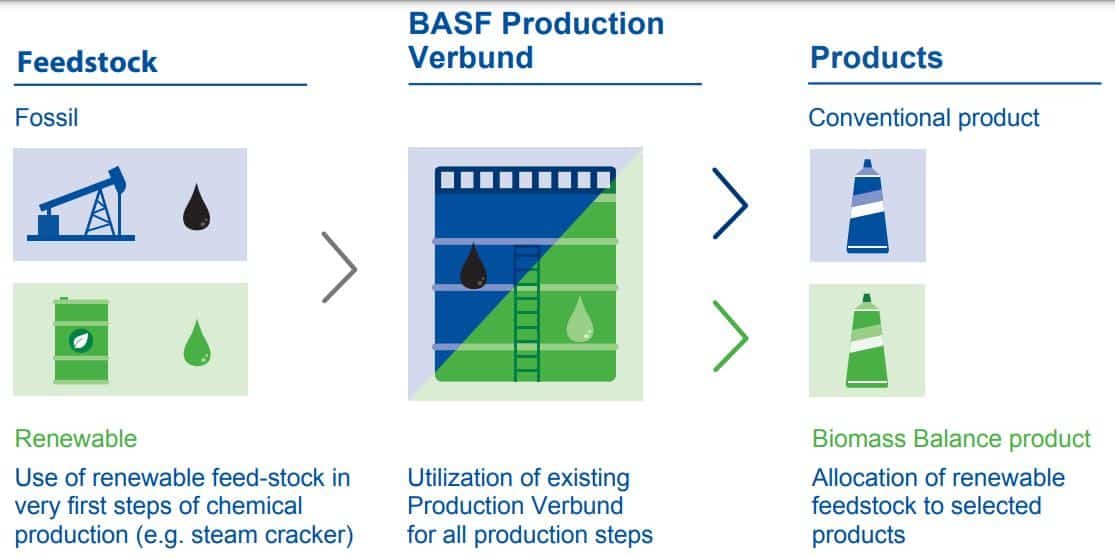German chemical giant BASF announced the launch of the first biomass balanced plastic additives that can reduce a product’s carbon footprint by up to 60%.
Manufacturing the new plastic additives uses renewable feedstocks instead of fossil fuel-based feedstocks. As such, these novel product solutions can help companies’ achieve their sustainability targets such as reducing carbon emissions, BASF said.
BASF is the leading innovative global partner for plastic additives, focusing on aligning with customer sustainability goals through its biomass balance approach. As per ISCC Plus (International Sustainability and Carbon Certification), BASF new additives are certified by TÜV Nord for mass balance.
BASF Biomass Balance Approach
This manufacturing approach is a groundbreaking way of using renewable resources in the chemical industry. BASF uses this approach in its integrated production system and applies it to the majority of its products.


Under this method, renewable raw materials such as bio-naphtha or biomethane from organic wastes, crops, or vegetable oils are used as feedstock at the very beginning of the Production Verbund.
The BASF Verbund system creates efficient value chains, extending from basic chemicals right through to high-value-added products such as coatings.
The ISCC PLUS certifies this production process. It’s an international certification program that ensures the chain of custody along the value chain from feedstocks to final product.
The renewable resources used are then allocated to the respective sales products using a 3rd-party verified certification method. The chemical expert markets its biomass balanced products under its BMBcert™ portfolio.
BMBcert™ additives are a part of BASF’s VALERAS™ portfolio to create new value for plastics. The first certified biomass balanced plastic additives include the Irganox 1010 BMBcert and Irganox 1076 FD BMBcert.
This first offering will initially be produced at BASF’s site in Kaisten, Switzerland, with further availability in McIntosh, USA in early 2024.
These innovative product offerings are identical to the conventional grades in terms of performance, quality, and regulatory. Thus, customers don’t have to reformulate their products or requalify the biomass balanced plastic additives.
Saving on Fossil Resources and Carbon Emissions
With their sustainably sourced renewable feedstocks, the products’ cradle-to-gate carbon emission is significantly lowered by up to 60% versus the global average product CO2 footprint of conventional grades.
[embedded content]
The certified biomass balanced plastic additives offer customers unique product solutions, along with the following major benefits.
Saves fossil resources: rather than sourcing virgin fossil fuel feedstocks, the additives use renewable resources, thereby saving on fossil resources. The bio-based amount is then allocated to specific products sold by means of the certified method.
Saves carbon emissions: by replacing fossil fuel-based materials with bio-based resources, biomass balanced plastic additives save on carbon footprint. By applying a closed chain of custody, the carbon savings for each product is quantifiable.
Independent certification: An independent certification validates that BASF plastic additives have replaced fossil feedstock following the REDcert2 requirements.
Identical product performance: the drop-in solution applies for other BASF products, such as dispersions and superabsorbent. These biomass balanced products have identical formulation and quality but can reduce carbon emissions significantly.
Highlighting these characteristics and benefits of their sustainable plastic additives, Joerg Bentlage at BASF said:
“By leveraging BASF’s highly integrated global production network of interconnected sites and plants, we are able to produce these industry-first, low carbon footprint, drop-in solutions with the same performance characteristics.”
The certified additives thus contribute to global sustainable development by saving fossil resources, reducing carbon emissions, and promoting the use of renewable resources.
BASF’s innovative product solution allows partner companies to meet their sustainability goals without trading off performance and quality, signifying a significant step toward sustainability in the chemical industry.
- SEO Powered Content & PR Distribution. Get Amplified Today.
- PlatoData.Network Vertical Generative Ai. Empower Yourself. Access Here.
- PlatoAiStream. Web3 Intelligence. Knowledge Amplified. Access Here.
- PlatoESG. Carbon, CleanTech, Energy, Environment, Solar, Waste Management. Access Here.
- PlatoHealth. Biotech and Clinical Trials Intelligence. Access Here.
- Source: https://carboncredits.com/basfs-new-plastic-additives-reduces-co2-footprint-by-60/



